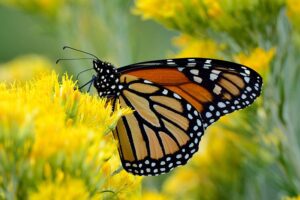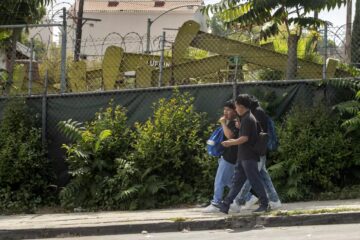Monarch butterflies now listed as endangered: What we can all do to help them
The migratory monarch butterfly has been added to the endangered species ‘Red List’ by the International Union for the Conservation of Nature in mid-July 2022. This colorful butterfly is known for its spectacular migration of up to 2,500 miles from Mexico to Canada, taking several generations to complete the route. During their lifespan, most butterflies only experience part of the migration.
The migratory monarch butterfly (Danaus plexippus plexippus), a subspecies of the monarch butterfly (Danaus plexippus), travels from its summer breeding grounds, which may be as far north as Canada, to overwinter at sites in Mexico. The Western population is at greater risk of extinction than the Eastern population , having shrunk from millions in the 1980s to not even 2,000 butterflies in 2020. Surprisingly, there was a rebound to almost 250,000 in 2021, but that still represents a 98% decline. The larger Eastern population shrunk by 84% from 1996 to 2014.
The declining populations are attributed to
- Legal and illegal logging
- Deforestation to make room for agriculture and urban expansion
- Pesticides that kill the butterflies directly
- Herbicides that kill milkweed, the only plant that the butterflies’ larvae feed on
- Global warming and climate change factor, including:
- drought that limits the growth of milkweed and increases the frequency of catastrophic wildfires
- temperature extremes that trigger migrations before milkweed is available
- severe weather such as hurricanes and hail storms that kill butterflies
How you can help
- If you have a garden, plant native milkweeds, but be aware of the plant’s sourcing and avoid plants treated with pesticides or Bt (Bacillus thuringiensis), a biological pest control that targets nuisance caterpillars but also kills monarch larvae.
- Don’t use insecticides or herbicides. Learn about alternative methods for integrated pest management.
- The Conejo Open Space Foundation (COSF) has had some relevant presentation in their Speaker Series. View Dr. Sean Anderson’s talk on climate change and Betina Loudermilk’s talk about butterfly gardening from COSF’s Speaker Series.
- Attend COSF’s Native Plantpalooza & Eco Fest on Saturday morning, October 1, at Conejo Creek North Park in Thousand Oaks, to learn about growing native California plants, including milkweed. Register online to save your place!




0 Comments